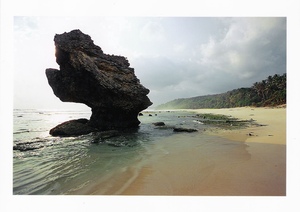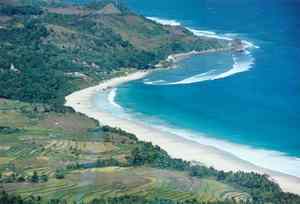 |
| Rock of all ages. |
The Nusa Tenggara island of Sumba is home to a living ‘ancient' culture. Lying south of Flores across the Sawu Sea, it is only a short distance from Bali yet the journey represents a great leap back into the past that can be both exhilarating and relaxing. Eco-tourism takes on a whole new meaning with this ancient culture.
 |
| Paradisal coast of Sumba. |
The first thing that strikes visitors about Sumba isn't that it is beautiful - although it is - it's just that it is still so beautiful. That while it is ‘discovered', it is also undiscovered; its pleasures are those of a revealing natural beauty, a graphic raw nature in which Sumba's inhabitants live close to the influences of sun, rain and wind, of sea and mountain and forest.
To glorify them by praising them for not ‘moving' with the times or not embracing the advance of encroaching tourism is to miss the point. People from Sumba are not unaware of the rising tides of economic pressure - they send their children, when they can, elsewhere to receive education, find jobs and get training so that they can return to the island with beneficial knowledge.
 |
| Reliving ancient cultures today. |
Sumba, all 11,000 square kilometres of it, was colonised late by the Dutch in 1866, although they didn't really take control until the advent of the twentieth century. The pre-colonised Sumbanese lived in tribal groups that included relations from the Majapahit Empire. With the arrival of the Dutch came the religious influences that shape the island's demographics today with a mix of Christians, including a small number of Roman Catholics, a strong, almost thirty percent presence of traditional animism and a small group of Sunni Muslims along the coast. This harmonic acceptance is indicative of Sumba where welcome is important.
Sumba is completely fascinating: megalithic burials still take place. These stone tombs were used in prehistoric times throughout Europe and their existence and continued construction in Sumba is an express ticket back to ancient history. Ancient history aside Sumba is also a living window into the recent past of other islands in the archipelago. Sparsely populated, and minimally developed it offers an escape for those who are seeking respite from the rapacious nature of modern life and desire nothing more than to be at peace with whatever nature has planned.
Certainly this was what drew Claude Graves to Sumba over 15 years ago. As one of the founders of the Sumba Foundation and one of the people behind Nihiwatu Resort, Claude recognised the need to preserve Sumba without suppressing the needs of the people to live in a world were they can achieve better health care and education.
Nihiwatu, through the creation of the Sumba Foundation became a model for genuine eco-tourism, establishing itself in a way that commits to giving more than it takes. By creating a resort that exists in harmony with its surroundings that offers guests a chance to dissolve' into nature while being supported by the indulgence of fine food and elegant care, Nihiwatu has achieved balance.
A balance that enables guests to enjoy activities such as mountain trekking, bird watching and horse riding. Also to fish, dive and surf in the incredible waters surrounding the island while contributing to their hosts by volunteering in local activities, helping out at the school, playing soccer with kids or putting to use any skill or technical ability. There is also the opportunity for guests to spend a day with traditional villages as they go about their activities. None of these activities are put on' for show, or tailored to the visitor - a genuine cultural exchange that's once taken, never to be forgotten.
 |
| Ancient village of Sumba. |
 |
| Unspoilt by modern technology. |
The people live expressively: they perform religious ceremonies and display creativity distinctly, create intricate weaving of cloth that denote rank and wealth, take part in vigorous and physical ceremonies involving hunting and mock tribal warfare that mark cleansing rituals and sacred rituals that abate ill fortune and please the omnipresent spirits. Their traditional beliefs are inextricable from daily life. Should you have the fortune to witness a ceremony or village event, you too may feel the intense power that comes from being in the midst of an ancient but still vibrant culture.
At Nihiwatu there is an inclusive family policy, everyone is welcome. Nihiwatu is a haven for children, with safe activities and plenty of fun to be had, but with that added element of the ability to truly engage. One can never predict where the seeds of knowledge will grow but I would take a chance and say that any child visiting Sumba will leave with an indelible memory of a life enhancing experience. I know certainly that the two teenage children who travelled there recently have returned with open eyes, open hearts and open minds.
They speak enthusiastically of the cliffs they climbed, the mud they wallowed in, the horses they rode on and the people they met, and at the same time of the need to return to help out with the projects of the Sumba Foundation and to share their knowledge of Sumba, not just with others who could visit but with people everywhere so that they too can be aware that we can all contribute to preserving, protecting and positively helping some of the most beautiful people on the planet: The people of Sumba.
Learn more of the Sumba Foundation www.sumbafoundation.org
Nihiwatu
Kuta PoLeng Complex Block C/2
Kuta 80361
Bali, Indonesia
Tel : 62 361 757 149
Fax: 62 361 755 259
Getting there: Flights arrive regularly from Bali with both Merpati and Pelita Airlines. Pelita also fly to Sumba from Labuanbajo in Flores and there is a service running out of Kupang in West Timor.
Visa: Indonesia has a visa on arrival procedure that costs $25 for 30 days stay and there is a departure tax of 150.000 Indonesian rupiah
